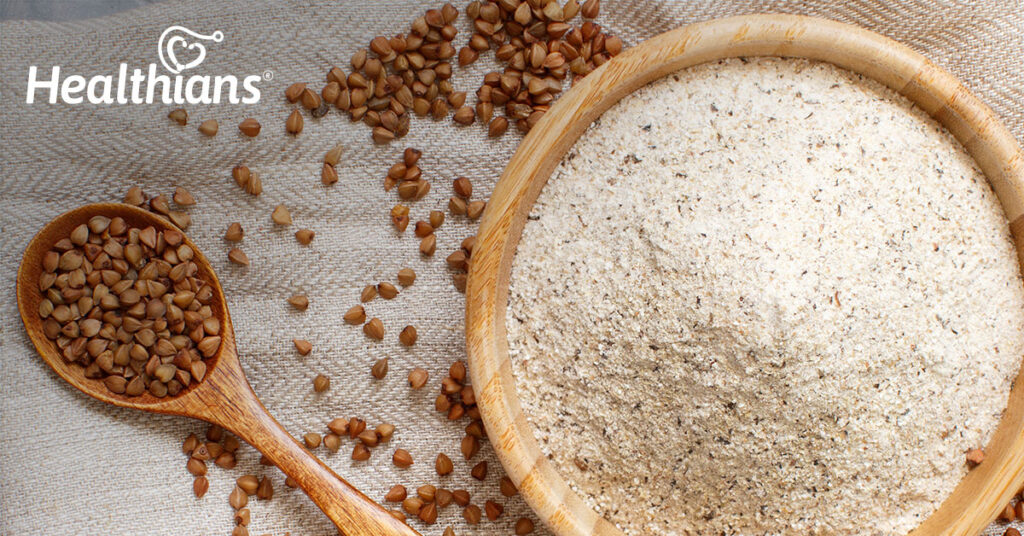Introduction
Buckwheat, despite its name, is a pseudocereal that many people consider to be a superfood. Also known as Kuttu Giri, it has recently gained immense popularity as a gluten-free alternative to grains, as well as for its nutritional benefits. In this article, we will look at the nutrition present in buckwheat and its potential health benefits.
It is a plant that belongs to the Polygonaceae family. Despite its name, it is not a type of wheat but rather a pseudocereal, which means that it is used in the same way as cereal grains such as wheat but is not a member of the grass family.
It is grown for its edible seeds, which have a distinct nutty flavour and are triangular in shape. The seeds, also known as ‘groats,’ can be cooked and added to salads, soups, and stir-fries. Buckwheat flour is also produced and used to make pancakes, noodles, and other baked goods. It is gluten-free, making it a popular option for those suffering from celiac disease or gluten intolerance. High-fibre, protein-rich food that also contains important minerals like magnesium and manganese.
The nutritional content of Buckwheat:
One cup (168g) of cooked buckwheat groats contains the following nutrients:
• 155 calories
• 33g carbohydrate
• 5g fibre
• 6g protein
• 1g fat
• Magnesium: 20% of the daily value
• Phosphorus: 17% of the daily value
• Manganese: 17% of the daily value
• Copper: 13% of the daily value
• Iron: 10% of the daily value
• Contains antioxidants such as rutin and quercetin.
Health benefits of Buckwheat:
- According to research, high-protein foods are essential for weight management because they provide more satiety with fewer calories than other types of food. Including buckwheat in a healthy diet may increase satiety and help you lose extra pounds fast.
- Studies have found that buckwheat is high in flavonoids, which can help lower blood pressure and improve blood lipid profiles. A bowl of this cereal in the morning can therefore help in lowering the risk of heart disease.
- Buckwheat is high in fibre, which can help promote healthy digestion. People suffering from constipation should include it in their diet as it not only softens the stools but also eases bowel movements.
- Various studies have linked buckwheat consumption to lower blood sugar in people with diabetes This can be attributed to the fact that it has a low glycemic index, which means it can help regulate blood sugar levels and prevent insulin spikes.
- Buckwheat contains magnesium and phosphorus, both of which are necessary for strong bones. Regular consumption of buckwheat can help in reducing the risk of developing osteoporosis.
- Buckwheat is one of the highest dietary sources of flavonoid rutin, which fights inflammation, so it has also been used in treating arthritis.
- This is naturally gluten-free, making it a safe alternative for those suffering from celiac disease or gluten intolerance.
How to incorporate Buckwheat into your diet
This is a versatile grain that can be prepared in the same way that rice or quinoa is and used in a variety of dishes. Here are some ways to include buckwheat in your diet:
- Serve as a salad or bowl base.
- Buckwheat flour can be used to make porridge or pancakes.
- To make gluten-free baked goods, use buckwheat flour.
- Make soba noodles.
- Buckwheat groats can be used in place of rice in stir-fries.
Potential side-effects of Buckwheat
While intake of buckwheat is generally safe for most people, there are a few potential drawbacks to be aware of:
- Buckwheat is high in oxalates, which can contribute to kidney stone formation in susceptible people.
- Buckwheat can be difficult to digest for some people, particularly those who have digestive issues.
- Buckwheat products that have been processed, such as flour or noodles, may be less nutritious than whole buckwheat groats.
Final thoughts
Buckwheat is a nutritious pseudocereal that can be a wonderful addition to your diet. It is a cheap and effective choice due to its high fibre and antioxidant content, as well as its potential to improve heart health, support digestive health, and lower blood sugar. However, it is critical to be aware of the potential disadvantages and to choose whole, unprocessed groats whenever possible. If you’re thinking about adding buckwheat to your diet, talk to your doctor first to make sure it’s right for you.





